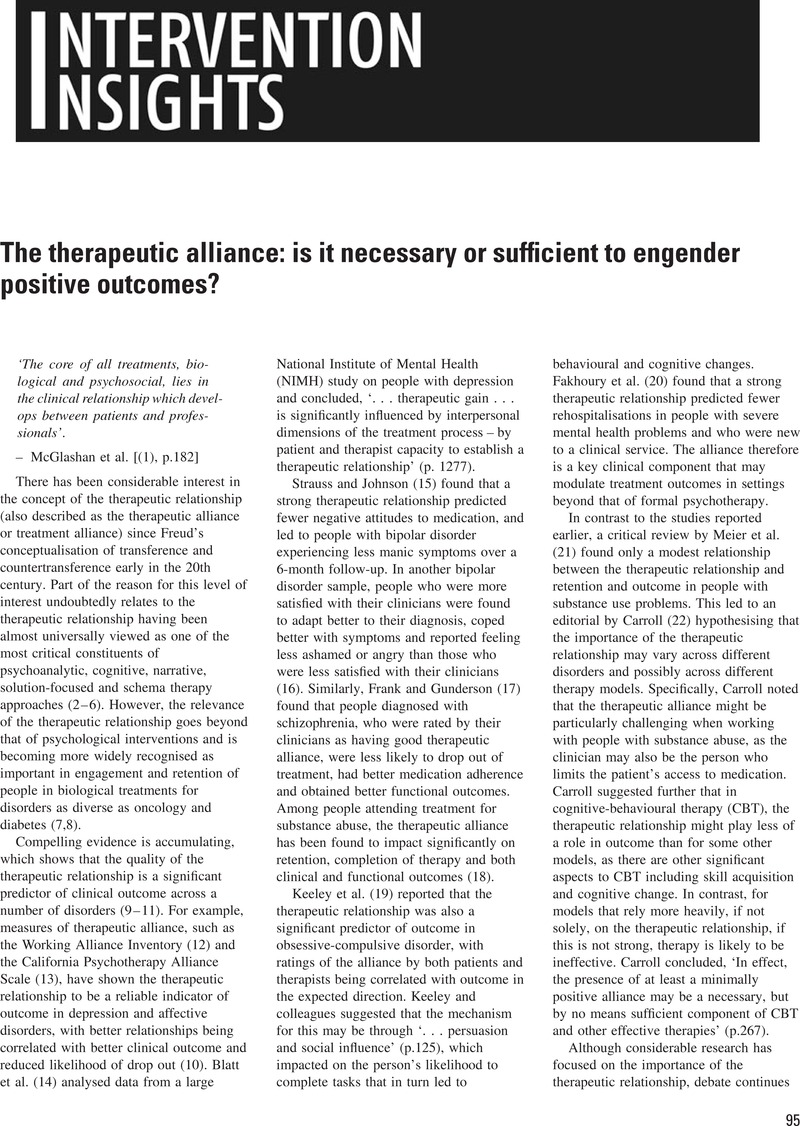Crossref Citations
This article has been cited by the following publications. This list is generated based on data provided by Crossref.
Malhi, Gin S.
Adams, Danielle
Cahill, Catherine M.
Dodd, Seetal
and
Berk, Michael
2009.
The Management of Individuals with Bipolar Disorder.
Drugs,
Vol. 69,
Issue. 15,
p.
2063.
Conus, Philippe
Cotton, Sue
Schimmelmann, Benno G
Berk, Michael
Daglas, Rothanthi
McGorry, Patrick D
and
Lambert, Martin
2010.
Pretreatment and outcome correlates of past sexual and physical trauma in 118 bipolar I disorder patients with a first episode of psychotic mania.
Bipolar Disorders,
Vol. 12,
Issue. 3,
p.
244.
Francey, S.M.
Nelson, B.
Thompson, A.
Parker, A.G.
Kerr, M.
Macneil, C.
Fraser, R.
Hughes, F.
Crisp, K.
Harrigan, S.
Wood, S.J.
Berk, M.
and
McGorry, P.D.
2010.
Who needs antipsychotic medication in the earliest stages of psychosis? A reconsideration of benefits, risks, neurobiology and ethics in the era of early intervention.
Schizophrenia Research,
Vol. 119,
Issue. 1-3,
p.
1.
Barnes, Thomas RE
2011.
Evidence-based guidelines for the pharmacological treatment of schizophrenia: recommendations from the British Association for Psychopharmacology.
Journal of Psychopharmacology,
Vol. 25,
Issue. 5,
p.
567.
Conus, Philippe
Bonsack, Charles
and
Söderström, Dag
2012.
L'hôpital psychiatrique : un lieu pour la formation à la psychothérapie des troubles psychotiques.
L'information psychiatrique,
Vol. 88,
Issue. 7,
p.
527.
Hinton, Devon E.
and
Nickerson, Angela
2012.
The Oxford Handbook of Traumatic Stress Disorders.
p.
504.
Barazzone, Natalie
Cavanagh, Kate
and
Richards, David A
2012.
Computerized cognitive behavioural therapy and the therapeutic alliance: A qualitative enquiry.
British Journal of Clinical Psychology,
Vol. 51,
Issue. 4,
p.
396.
Picken, Alicia
and
Cogan, Nicola
2012.
The experiences of clinicians using formulation in adult mental health: An interpretative phenomenological analysis.
Clinical Psychology Forum,
Vol. 1,
Issue. 233,
p.
37.
Antoniou, Pavlina
and
Cooper, Mick
2013.
Research Paper Psychological treatments for eating disorders: What is the importance of the quality of the therapeutic alliance for outcomes?.
Counselling Psychology Review,
Vol. 28,
Issue. 4,
p.
34.
Cavanagh, Kate
and
Millings, Abigail
2013.
(Inter)personal Computing: The Role of the Therapeutic Relationship in E-mental Health.
Journal of Contemporary Psychotherapy,
Vol. 43,
Issue. 4,
p.
197.
Wolfe, Samantha
Kay-Lambkin, Frances
Bowman, Jenny
and
Childs, Steven
2013.
To enforce or engage: The relationship between coercion, treatment motivation and therapeutic alliance within community-based drug and alcohol clients.
Addictive Behaviors,
Vol. 38,
Issue. 5,
p.
2187.
Sly, Richard
Morgan, John F.
Mountford, Victoria A.
and
Lacey, J. Hubert
2013.
Predicting premature termination of hospitalised treatment for anorexia nervosa: The roles of therapeutic alliance, motivation, and behaviour change.
Eating Behaviors,
Vol. 14,
Issue. 2,
p.
119.
Lakeman, Richard
2013.
Talking science and wishing for miracles: Understanding cultures of mental health practice.
International Journal of Mental Health Nursing,
Vol. 22,
Issue. 2,
p.
106.
Walji, Irram
Simpson, Jane
and
Weatherhead, Stephen
2014.
Experiences of engaging in psychotherapeutic interventions for sexual offending behaviours: A meta-synthesis.
Journal of Sexual Aggression,
Vol. 20,
Issue. 3,
p.
310.
Stiles-Shields, Colleen
Bamford, Bryony H.
Touyz, Stephen
Le Grange, Daniel
Hay, Phillipa
and
Lacey, Hubert
2016.
Predictors of therapeutic alliance in two treatments for adults with severe and enduring anorexia nervosa.
Journal of Eating Disorders,
Vol. 4,
Issue. 1,
Conus, Philippe
Cotton, Sue
Schimmelmann, Benno G.
McGorry, Patrick D.
and
Lambert, Martin
2017.
Rates and predictors of 18-months remission in an epidemiological cohort of 661 patients with first-episode psychosis.
Social Psychiatry and Psychiatric Epidemiology,
Vol. 52,
Issue. 9,
p.
1089.
Kaskela, Teemu
and
Tourunen, Jouni
2018.
Facing drug problems and advancing sentence plan. Prisoners’ perspectives on drug treatment programmes in Finland.
International Journal of Comparative and Applied Criminal Justice,
Vol. 42,
Issue. 2-3,
p.
195.
Tremain, Hailey
McEnery, Carla
Fletcher, Kathryn
and
Murray, Greg
2020.
The Therapeutic Alliance in Digital Mental Health Interventions for Serious Mental Illnesses: Narrative Review.
JMIR Mental Health,
Vol. 7,
Issue. 8,
p.
e17204.
Barnes, Thomas RE
Drake, Richard
Paton, Carol
Cooper, Stephen J
Deakin, Bill
Ferrier, I Nicol
Gregory, Catherine J
Haddad, Peter M
Howes, Oliver D
Jones, Ian
Joyce, Eileen M
Lewis, Shôn
Lingford-Hughes, Anne
MacCabe, James H
Owens, David Cunningham
Patel, Maxine X
Sinclair, Julia MA
Stone, James M
Talbot, Peter S
Upthegrove, Rachel
Wieck, Angelika
and
Yung, Alison R
2020.
Evidence-based guidelines for the pharmacological treatment of schizophrenia: Updated recommendations from the British Association for Psychopharmacology.
Journal of Psychopharmacology,
Vol. 34,
Issue. 1,
p.
3.
Uhl, Alexus
Addo-Yobo, Annette
Boland, Grace
Watkins, Rita
Senegal, James
and
Salami, Temilola
2023.
Mental Health Providers and Peers Help Enhance the Effectiveness of Law Enforcement Mental Health Interventions.
Journal of Police and Criminal Psychology,
Vol. 38,
Issue. 3,
p.
774.



